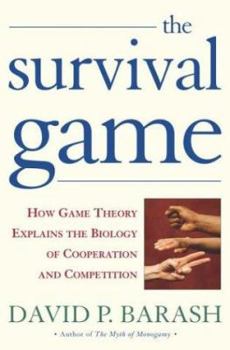The Survival Game: How Game Theory Explains the Biology of Cooperation and Competition
Select Format
Select Condition 
Book Overview
From a zoologist and psychologist, an astonishing look at the biological and strategic roots of human decisions Humans, like bacteria, woodchucks, chimpanzees, and other animals, compete or cooperate in order to get food, shelter, territory, and other resources to survive. But how do they decide whether to muscle out or team up with the competition?In The Survival Game , David P. Barash synthesizes the newest ideas from psychology, economics, and biology to explore and explain the roots of human strategy. Drawing on game theory-the study of how individuals make decisions-he explores the give-and-take of spouses in determining an evening's plans, the behavior of investors in a market bubble, and the maneuvers of generals on a battlefield alongside the mating and fighting strategies of "less rational" animals. Ultimately, Barash's lively and clear examples shed light on what makes our decisions human, and what we can glean from game theory and the natural world as we negotiate and compete every day.
Format:Hardcover
Language:English
ISBN:080507175X
ISBN13:9780805071757
Release Date:December 2003
Publisher:Times Books
Length:302 Pages
Weight:1.32 lbs.
Dimensions:1.1" x 6.3" x 9.4"
Customer Reviews
3 ratings
Glad I bought this book
Published by Thriftbooks.com User , 15 years ago
The Survival Game is clear, insightful, and comprehensive. Dr. Barash covers science, philosophy, and practical life experiences. I'm in a conflict resolution Ph.D. program that studies game theory a lot, but this book changed my thinking about that theory and human conflict.
Great intro to the many applications of game theory
Published by Thriftbooks.com User , 17 years ago
This book is excellent as an introduction both to the basic principles of game theory as well as its applications in various fields. Game theory is often known as a tool of economists (indeed, its early innovators won Nobel prizes in economics), but Barash does an excellent job of relating its themes to psychology, ecology, and evolution, as well as economics and politics, while giving the reader a good general understanding of how the theory works. With no more math than it takes to solve a sudoku puzzle, this is a great introduction to game theory. I would especially recommend this to students in the biological and/or behavioral sciences.
A level playing field?
Published by Thriftbooks.com User , 20 years ago
The roots of game theory in biology go back several decades. Roger Fisher's studies in the 1930s are generally credited with initiating the concept. Later, Robert Axelrod and others expanded the idea with structured game applications. The most famous of these is the Prisoner's Dilemma, where two charged thieves are offered "deals" by authorities. Prisoner's Dilemma is easily played by any two people with a moderator. The point of the game is to reconcile the issues of "defection" and "cooperation" with various "payoffs". As Barash shows, the game is played often, usually unconsciously, by many people under varying conditions. It is an underlying theme in many international situations. Barash here introduces us to the basics of game theory, with many illustrative examples in human and other animal behaviour. From simple game propositions, Barash goes on to explain the many variations and how to assess them. Instead of mathematical equations, which he eschews in the opening chapter, Barash provides matrix box sets with players, options and outcome results for each game set. He then explains the logic of strategy variations for a single game encounter. He points out that single encounters may neither validate the game nor the strategy applied. The most famous variation of Prisoner's Dilemma is called Tit-for-Tat. This game's bizarre history is recounted well - it was twice chosen the best option in a contest for "best strategy". In this game, a form of Prisoner's Dilemma is played repeatedly - with the caveat that whatever your opponent does, you must respond in kind. The game's simple rule shattered many myths about the foundations of human behaviour. Genes may be selfish, but humans are not. Cooperation has its own payoffs. Once applied only to humanity, game theory has found many examples throughout Nature, and not just animals. Since part of game theory deals with resource use, even forest trees can be shown to apply it to growth patterns. Jungle frogs, in their competitive mating strategies make decisions explainable by Barash's matrix diagrams. How far, then, can its usefulness extend. As game theory has been demonstrated to have nearly universal meaning, critics have raised objections. Americans, as Barash carefully notes, find it objectionable on the grounds it shatters their myth of "rugged individualism" - the notion that success comes to whoever goes out and grabs it by the scruff of the neck, ignoring objections of others. Others have decried attempts to apply it to every human circumstance. Barash dismisses this critique as overstated. Game theory isn't a universal "theory of everything" - a quest physicists have vainly sought for years. On the other hand, America, as with every society, must play the Social Dilemma Game - Personal Gain versus the Public Good. Barash's examples are mixed biology, diplomacy, domestic politics and personal encounters. Although he regrets the little attention paid to game theo





